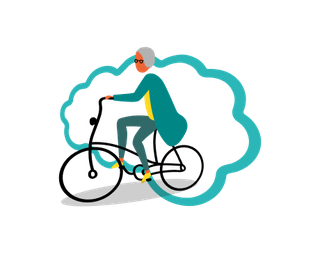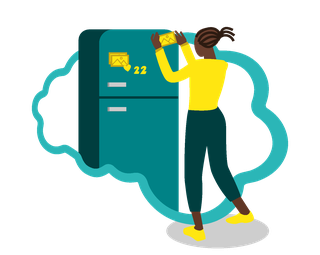Staying on top of things
The techniques and strategies we use to improve how we feel when we're low, stressed or anxious can also be used to help us to stay well.
The more you practise the techniques you have learnt, the more likely they are to become habits. Making caring for your mental wellbeing part of your routine can help you to protect your mental health and manage difficult situations or setbacks more easily.
These 6 tips will help you combine everything you have learnt into a personal plan for staying well.
Video: Staying on top of things
Consolidate everything you have learnt using the tips in this video and learn how to build a wellbeing routine to help make your mental health a habit.
How to make your mental health a habit

1. Find what works for you
We are all different, and that's as true of our mental wellbeing as it is our music taste.
By now, you may have tried a few different techniques and found that some work particularly well for you. Make a note of what helps you the most so you can look back whenever you need a reminder.
To get started, consider the following areas:
- activities you enjoy
- challenging your thinking
- relaxation
- solving problems
- your support system
You may also want to include any of our videos you have found useful, or the thought record exercise.

2. Watch out for warning signs
Before experiencing anxiety, stress or a low mood there will usually be some warning signs that things are not going as well. If you're aware of these, you can take action to get back on track.
Think about your personal warning signs – it might be helpful to use these categories:
- unhelpful thoughts – are there any specific negative thoughts you tend to have?
- emotions – what emotions do you experience before a setback?
- behaviours – is there anything you do or stop doing before a setback?
- physical feelings – do you experience any sensations or symptoms before a setback?

3. Make sense of setbacks
It's totally normal to have down days or times that feel more difficult. When they come, it's important to remember they do not mean you're back at square one.
As well as using the tips above to prevent tough times from getting worse, it can help to spend some time trying to make sense of your setbacks and consider if there's anything you can learn from them.

4. Know your triggers
If you are aware of any specific situations or circumstances you're likely to find challenging, you can make sure you put everything you have learnt into practice to help manage these more easily.
For example, if you're busy at work and have lots of deadlines coming up, it might be more important to make sure you have enjoyable and relaxing activities scheduled to give you some balance.
Think about any upcoming situations that could be challenging, and make a note of tips and strategies you could use to protect your mental wellbeing.
Video: Take the time to breathe
Erin has noticed that her busy mornings often trigger stress. If there’s a moment in your day that you find challenging, try to focus on your breathing like Erin does. It can help you feel calmer and more positive.

5. Check in regularly
Sometimes it can be easy to push how we're feeling to the back of our mind, so planning regular check-ins can help you prioritise your wellbeing and get in tune with yourself.
See if you can commit to checking in regularly, perhaps each month or every couple of weeks. You could run through your warning signs and assess whether you're experiencing any, think about the strategies you've been using and the progress you have made, or anything more you would like to work on.
It might be useful to write this down in a journal or on your phone.

6. Have everything in one place
It can be really useful to have all your personal "tools" for staying well in one place. This could be as a note on your phone or even on a piece of card somewhere handy like your wallet.
Include reminders of tips and techniques, early warning signs, and anything else you have learnt and find helpful.
It does not have to be long and can be laid out however is most useful to you. What's most important is that everything is easy to access and even easier to put into practice.
More self-help CBT techniques you can try

Bouncing back from life's challenges
Taking steps to stay on top of your mental wellbeing and build resilience can really help you deal with problems when times are tougher.
Find more ideas to try in self-help CBT techniques


